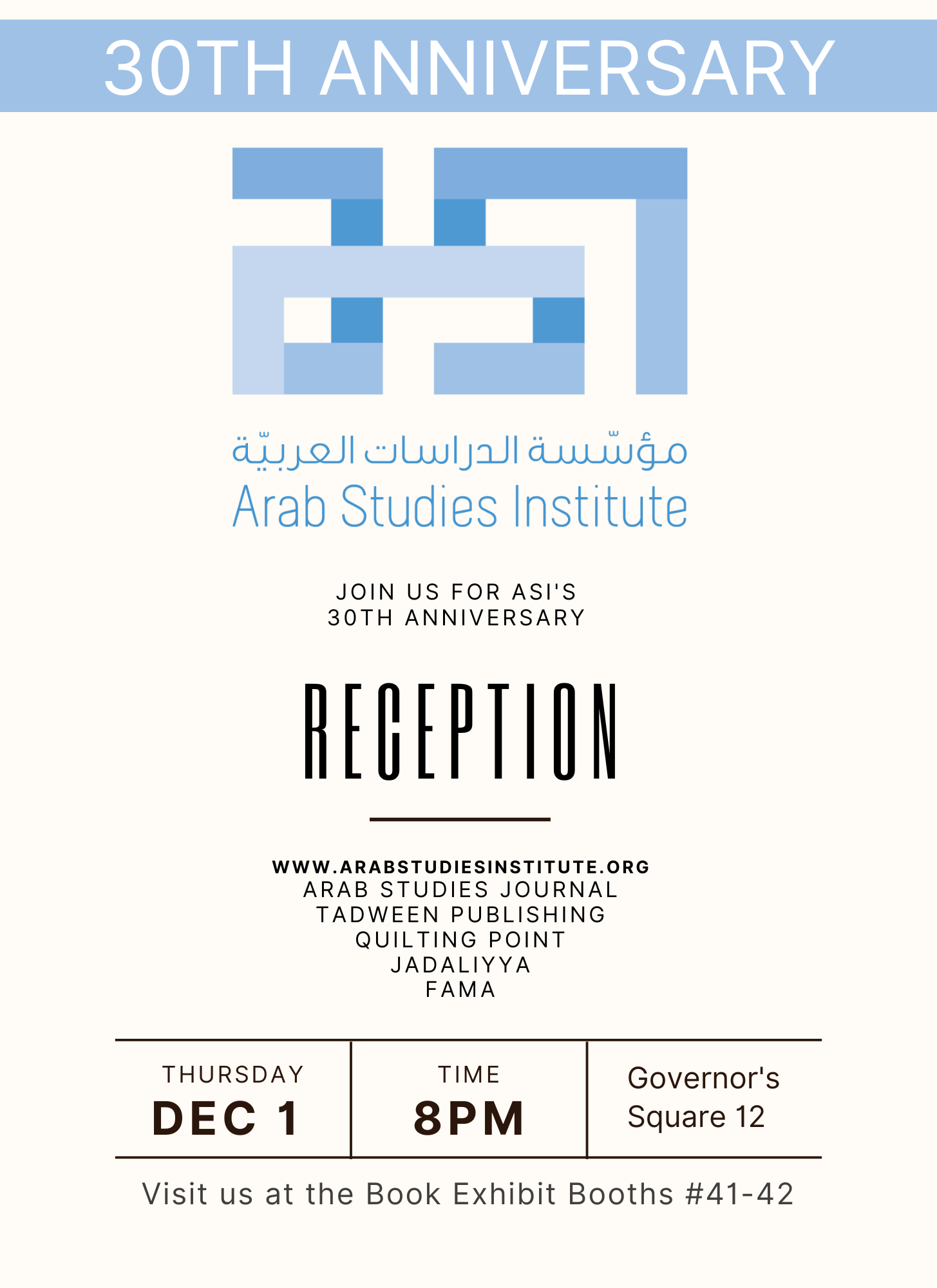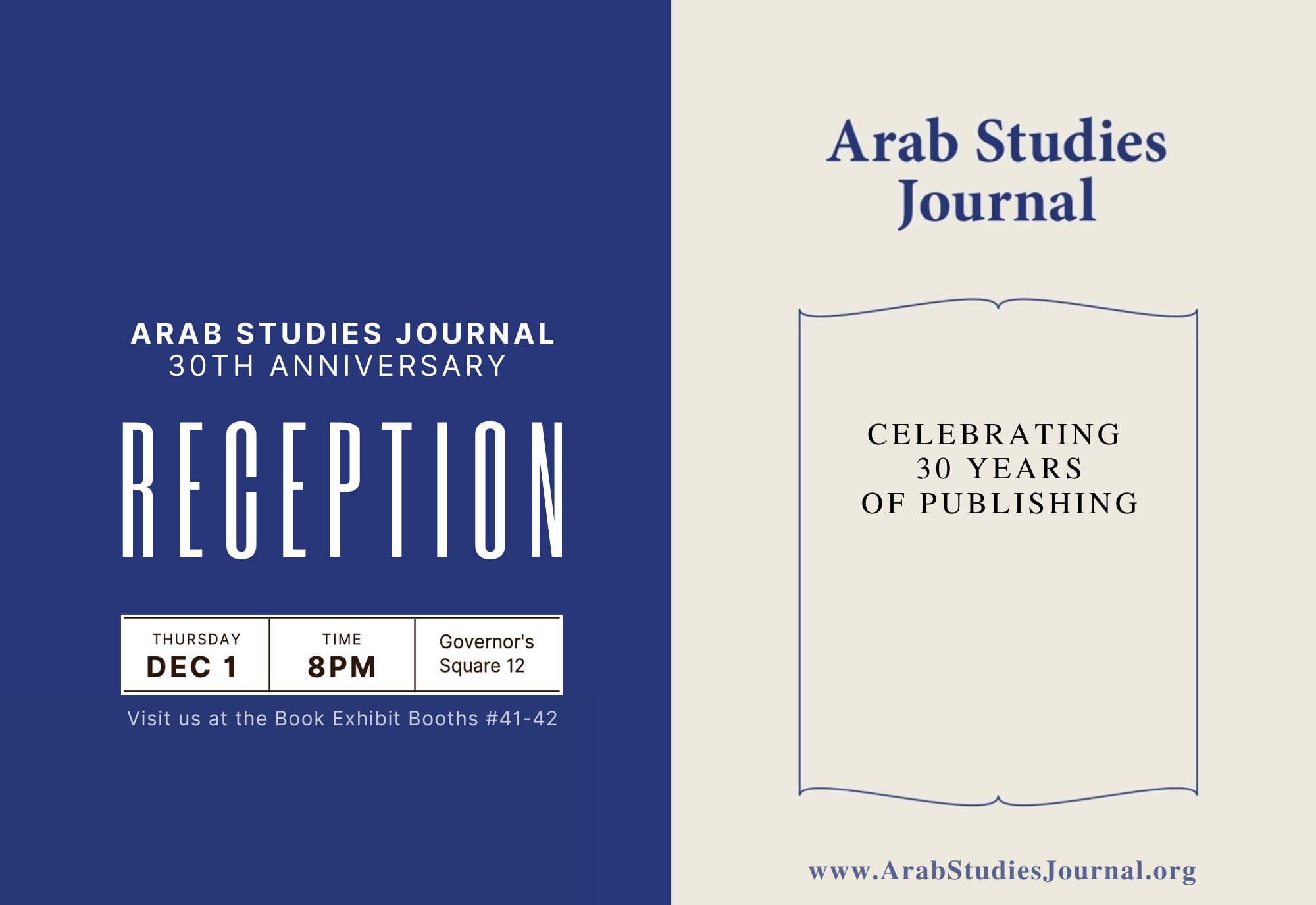The Arab Studies Institute is pleased to showcase the below selection of panels, roundtables, and presentations from the 2022 Annual Meeting of the Middle East Studies Association (MESA), being held from December 1-4. The list contains panels organized by, or those featuring as presenters, discussants, and chairs, members of the Arab Studies Institute and its various projects.
Please note that as per MESA rules, audience members must be registered for the conference. This year, MESA has a sliding scale for conference registration for existing MESA members (which they can self-select options).
Join us for our reception on Thursday (December 1) at 8 PM!

Gender, Capitalism, Law, and Empire: A Tribute to Judith Tucker
Thursday, December 1 at 3:00 pm
- Dr. Sherene Seikaly -- Discussant, Chair
- Dr. Toufoul Abou-Hodeib -- Presenter
- Dr. Hanan H. Hammad -- Presenter
- Dr. Kristen Alff -- Presenter
- Susanna Ferguson -- Organizer, Presenter
- Kylie Broderick -- Presenter
20 Years Since 'Rule of Experts': Current Paths in the Study of Technopolitics
Thursday, December 1 at 3:00 pm
- Prof. Timothy Mitchell -- Chair
- Dr. Owain Lawson -- Presenter
- Dr. Mattin Biglari -- Organizer, Presenter
- Ibrahim Elhoudaiby -- Presenter
- Rana Baker -- Organizer, Presenter
Roundtable on Sextarianism Organized by Sherene Seikaly
Friday, December 2 at 11:00 am
- Dr. Sherene Seikaly -- Chair/Discussant
- Dr. Maya Mikdashi -- Presenter
- Dr. Paul Amar -- Presenter
- Dr. Lara Deeb -- Presenter
Thinking with Iraq on Climate Change
Friday, December 2 at 1:30 pm
- Dr. Bridget Guarasci -- Presenter, Chair
- Dr. Huma Gupta -- Presenter
- Mona Damluji -- Organizer, Presenter
- Dr. Gokce Gunel -- Discussant
- Dr. Kali Rubaii -- Presenter
Strategies of Authoritarian Regimes
Friday, December 2 at 4:00 pm
- Dr. Sultan Tepe -- Presenter
- Dr. Francesco Cavatorta -- Chair
- Dr. Hesham Sallam -- Presenter
- Jean Lachapelle -- Presenter
- Dr. Ann Wainscott -- Presenter
- Ibrahim Oker -- Presenter
- Cagil Albayrak -- Presenter
Book Roundtable on The Flame Within: Iranian Revolutionaries in the United States
Saturday, December 3 at 8:30 am
- Dr. Bassam Haddad -- Presenter
- Dr. Golnar Nikpour -- Presenter
- Prof. Abdel Razzaq Takriti -- Presenter
- Manijeh Moradian -- Organizer, Presenter
The Maghreb Archiving Project
Saturday, December 3 at 11:00 am
- Dr. Muriam Haleh Davis -- Presenter
- Sumayya Ahmed -- Presenter
- Dr. Brahim El Guabli -- Presenter
- Samia Errazzouki -- Presenter
- Paraska Tolan-Szkilnik -- Organizer, Presenter
- Hassan Ould Moctar -- Presenter
Officers and Entertainment: Popular Culture and the State in Egypt
Saturday, December 3 at 3:00 pm
- Prof. Joel Gordon -- Presenter
- Dr. Peter Gran -- Chair
- Dr. Paul Sedra -- Presenter
- Dr. Zeinab Abul-Magd -- Organizer, Presenter
- Dr. Atef Said -- Presenter
- Dr. Hanan H. Hammad -- Presenter
- Hoda Yousef -- Presenter
- Dr. Adel Iskandar -- Presenter
- Dina El-Baradie -- Presenter
The Casual Consumption of the Middle East: The Region's (Re-)Construction in Entertainment
Saturday, December 3 at 5:30 pm
- Mekarem Eljamal -- Organizer, Presenter
- Sena Duran -- Presenter
- Kylie Broderick -- Chair
- John Kallas -- Organizer, Presenter
- Janina Santer -- Presenter
(Re)producing Rural Life: Critical Agrarian Perspectives of Labor in the MENA,
Sunday, December 4 at 8:30 am; sponsored by the Jadaliyya Environment page
- Anna Reumert -- Presenter
- China Sajadian -- Organizer, Presenter
- Brittany Cook -- Presenter
- Gabi Kirk -- Organizer, Chair
- Schluwa Sama -- Presenter
Climate, Water, and Ecology
Sunday, December 4 at 8:30 am
- Michael Christopher Low -- Chair
- Mohamed Abdou -- Presenter
- Carly Krakow -- Presenter
- Zeead Yaghi -- Presenter
- Alexandra Schultz -- Presenter
- Eleni Zaras -- Presenter
